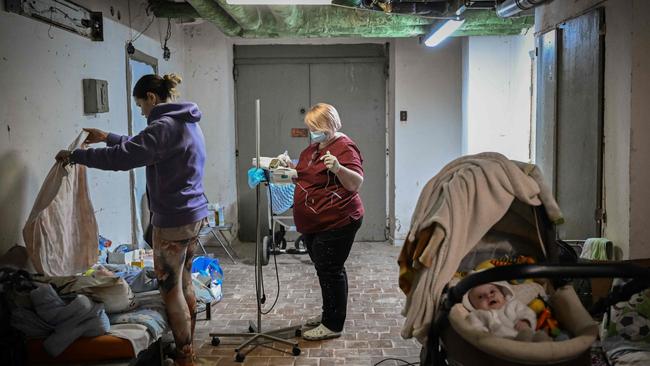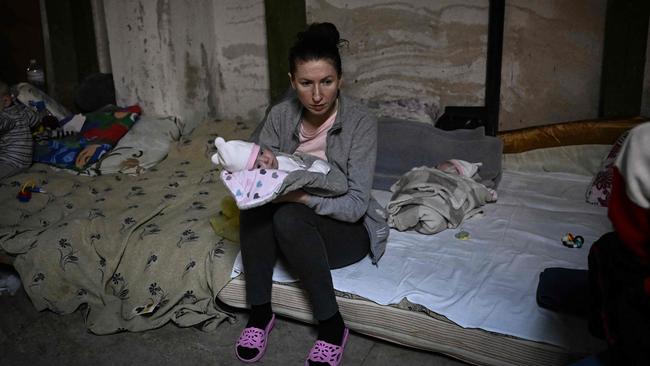War comes to kids who have already seen so much
Staff at Okhmatdyt children’s hospital run the risk of shelling and gunfire on the streets of Kyiv to come to work ... in the basement.

Serhii Chernysuk recalls the moment war came to his hospital.
Standing outside Kyiv’s children’s infirmary, the doctor heard gunfire and threw himself to the ground. On the road in front of him, Russian army vehicles came hurtling towards Ukrainian forces, who were firing automatic weapons at them. “I could have been shot,” he said. “It was a bad moment to stay near the gate.”
It was just the beginning of a night of horror for patients and medical staff. By the end of it, a seven-year-old boy and his uncle would be dead and doctors would be fighting to save the lives of their relatives.
The Russian army vehicles, Chernysuk was told, were part of a reconnaissance or sabotage mission. As they were pushed back by Ukrainian forces on Saturday night, civilians were caught in the crossfire.
An extended family of seven – four adults and three children – were trying to leave Kyiv when their car was torn up by bullets. It is not clear who shot them. Ukrainian forces took them to the hospital. A 12-year-old boy was taken to intensive care with a bullet wound in his cheek and a shrapnel injury in his spine. His cousin, 13, was brought in with bullet wounds in her leg and hand. Her little brother and uncle had been killed.
Surgeon Valeri Makoleivitch operated on her. “She was in a lot of shock,” he said, showing an X-ray of her hand with the bullet lodged by the knuckle of her little finger. “Now she’s being emotionally strong to support her mother, because her mother lost her youngest child.”
Like many other staff at Okhmatdyt children’s hospital, Makoleivitch was running the risk of shelling and gunfire on the streets of Kyiv to come to work, while his wife and two children sheltered at home.
“In the hospital I am proud that everyone is helping each other,” he said. “But I am so sorry for the kids being injured … the kids are scared, but there’s no panic, and the parents and the personnel are calming them.”
Chernysuk, a paediatric anaesthesiologist as well as medical director of the hospital, has not seen his wife and daughter for days, after the roads to the area outside Kyiv where they live were cut off by fighting.
“We have no choice, we must be brave,” he said. “Because our lives are only our business. Nobody can help us. And of course our patients are the main reason why we’re here.”
At night, he said, the hospital was alone, kilometres from the frontline, with no armed guards or soldiers nearby. Yet their 2000 staff keep working.
The risks are all too real. On Sunday, after the firefight, staff found three bullet holes in the hospital building. One of them had gone through the window of an ultrasound clinic, while another two hit an examination room.
No one was hurt. The children, the staff and their families had all been in air-raid shelters.
Among them was 20-month-old Polina and her mother Alona.
Last Wednesday Alona, 27, rushed Polina across the country for emergency treatment after she fell ill with diabetes. Now mother and daughter are stuck in Kyiv.
Around them, in what was until a few days ago a storeroom, were a dozen other patients and their mothers. At night, when the bombardment usually intensifies, about 200 people cram in here, curling up on the mattresses pushed up against the walls.
Unable to go home because of serious illness, injury or disease, the children and their mothers are waiting out the conflict. Some of the children are undergoing chemotherapy. Others are receiving blood transfusions or waiting for transplants that may now never come.

As the bombs fall, their mothers and the hospital staff have dragged mattresses and medical supplies into basements or damp storage facilities, making bomb shelters as best they can.
Inside one of the shelters, Tatiana Lemeshenko – a redhead with perfectly applied lipstick – and her daughter Veronika, 11, sat with brushes and watercolours, working on a painting-by-numbers picture of an owl. They were from the southern port city of Odessa, and had been living at the hospital since last autumn, as Veronika received treatment for serious digestive and cardiac problems.
“We can’t stop the treatment or all the results will be lost,” Lemeshenko, 35, who works at a car wash, said. “We have to stay here.”
A week ago, they had been receiving advanced medical care here. Now they fall asleep each night to the sound of shelling. During the day, they dash to the hospital buildings for Veronika’s medical treatments, listening out for the sirens that signal another round of bombardment.
“Sometimes I get scared,” Veronika said. “And if I do, I hide under my mum’s arm.”
“I tell her, you’re a fighter and fighters don’t panic,” said Lemeshenko, whose other two daughters are at home in Odessa with their grandmother.
At the other end of the shelter, Oksana, 29, sat looking at her daughter Nicole, who lay asleep under a fleece blanket. She is 14 months old, and was desperately sick with a rare blood disorder that affects the bone marrow.
Every two weeks, Oksana would take her to hospital for a blood transfusion. Yet what Nicole really needed was a bone marrow transplant. Ten days ago, Oksana had brought her to the hospital from their home in the northeast of Ukraine to start the process of matching with a donor. Now, as fighting raged around them, the prospect of finding one seemed almost impossible.
“It’s scary, the children are exhausted,” Oksana said.
All day, she said, she worried about her daughter, and about her husband, who was still at home in an area that had seen intense fighting. Asked what she would do next, her eyes brimmed with tears. “I don’t know what will happen,” she said. “I worry much more for my child than myself.”
THE TIMES



To join the conversation, please log in. Don't have an account? Register
Join the conversation, you are commenting as Logout